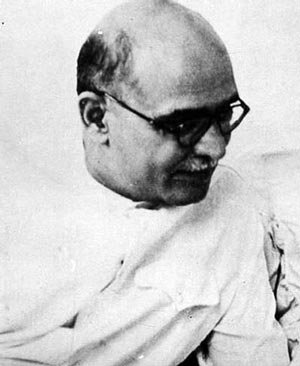
Gandhiji made many men and they in their turn made the Mahatma what he was. One of these was Mahadev Desai who worked as Gandhiji’s secretary for 25 years with unmatched devotion and affection.
He was born on 1 January 1892 at the Village of Saras in Olpad Taluka of Surat district, where his father Haribhai Desai was a school teacher. Mahadev lost his mother Jamnaben when he was only seven years of age.
At the young age of 13 Mahadev was married to Durgaben in 1905 and later the couple had one son, Narayan.
Mahadev Desai received primary and secondary education at different places like Surat , from where he matriculated in 1906, winning a scholarship for higher education. He joined the Elphinstone College at Bombay in 107 and graduated from there in 1910. He joined the Law College thereafter and got his LL.B in 1913.
After graduation Mahadev, while working for his livelihood, translated Lord Morley’s ‘On Compromise’ into Gujarati and won the hand some prize of a thousand rupees. This work was later published in 1925. He tried to practice law in courts but was not successful.
The month of August 1917, when Mahadev left Bank job, proved fateful, as he met Gandhiji on 31 August and found in him his Guru. Hereafter Mahadev as Gandhiji’s secretary moved like a shadow behind him till his death.
After Mahadev Desai joined Gandhiji, three important events took place in their life as well as that of the country. These were the Champaran Satyagraha (1917), the Bardoli Satyagraha (1930), and in all these Mahadev actively participated and courted arrest. In 1921 Gandhiji sent him to edit Motilal Nehru’s periodical and there too he was arrested and jailed. After his release in January 1923, he returned to Ahemdabad and looked after the editorial work of the Navajivan.
Between 1924 and 1928 he toured the country with Gandhiji, explaining the sailent features of the freedom striggle. He accompanied Gandhiji in 1931 to the Round Table Conference in London . In the Quit India Movement of 1942, he along with Gandhiji was arrested and sent to the Aga Khan Palace for imprisonment, where he died peacefully on 15 August 1942, deeply mourned by the nation and by Gandhiji in particular.

